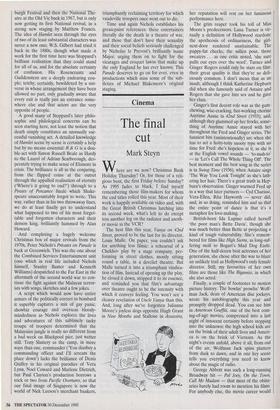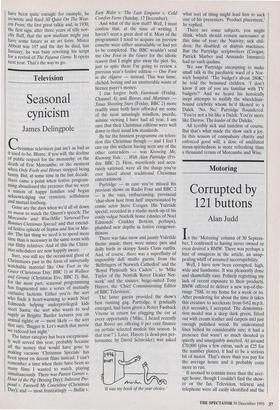Cinema
The final cut
Mark Steyn
Where are we now? Christmas Bank Holiday Thursday? Or, for those of a reli- gious bent, the first Friday before Sunday? As 1995 fades to black, I find myself remembering those film-makers for whom the end titles rolled this year. Most of their work is happily available on video and, with the Great British Christmas lurching into its second week, what's left to do except toss another log on the radiator and anoth- er movie in the VCR?
The best film this year, Vanya on 42nd Street, proved to be the last for its director, Louis Malle. On paper, you couldn't ask for anything less filmic: a rehearsal of a Chekhov play by a stage company, per- forming in street clothes, mostly sitting round a table, in a derelict theatre. But Mallc turned it into a triumphant vindica- tion of film. Instead of opening up the play, he closed it down, stripped it to its essence, and reminded you that film's advantage over theatre ought to be the intensity with which it conveys feeling. You won't see a clearer revelation of Uncle Vanya than this. And, long after we've forgotten Julianne Moore's joyless slogs opposite Hugh Grant in Nine Months and Stallone in Assassins, her reputation will rest on her luminous perfprmance here.
The grim reaper took his toll of Miss Moore's predecessors. Lana Turner is vir- tually a definition of Hollywood stardom: the apotheosis of ordinariness, the girl- next-door rendered unattainable. The puppy-fat cheeks, the sullen pout, those sweaters . . . as one critic noted, 'she sure pulls our eyes over the wool'. Turner and Ginger Rogers could only be stars on film: their great quality is that they're so deli- ciously common. I don't mean that as an insult, although I think Katherine Hepburn did when she famously said of Astaire and Rogers that she gave him sex and he gave her class.
Ginger's first decent role was as the gum- chewing, wise-cracking, fast-working chorine Anytime Annie in 42nd Street (1933), and, although they glammed up her frocks, some- thing of Anytime Annie stayed with her throughout the Fred and Ginger series. The funniest bits (unintentionally) are when she has to act a hoity-toity snooty type with no time for Fred: she's hopeless at it, as she is at the English vowel sounds — 'to-mah-to' — in 'Let's Call The Whole Thing Off'. The best moment and the best song in the series is in Swing Time (1936), when Astaire sings The Way You Look Tonight' as she's lath- ering her hair. There's a great truth in Hep- burn's observation. Ginger warmed Fred up in a way that later partners — Cyd Charisse, Vera-Ellen, Rita Hayworth — never did, and, in so doing, reminded him and us that the entire point of dance is that it's a metaphor for love-making.
British-born Ida Lupino called herself `the poor man's Bette Davis', though she was much better than Bette at projecting a kind of tough vulnerability. She's remem- bered for films like High Sierra, as long-suf- fering moll to Bogart's Mad Dog Earle. One of the half-dozen best actresses of her generation, she chose after the war to blaze an unlikely trail as Hollywood's only female director. Still, my favourites of her own films are those like The Bigamist, in which she also acted.
Finally, a couple of footnotes to motion picture history. The howlin' prowlin' Wolf- man Jack, dean of American disc jockeys, wrote his autobiography this year and promptly dropped dead. You can see him in American Graffiti, one of the best com- ing-of-age movies, compressed into a last night of innocent certainty before stepping into the unknown: the high school kids are on the brink of their adult lives and Ameri- ca is on the brink of Vietnam. As the night's events unfold, above it all, from out of the air, Wolfman Jack spins platters from dusk to dawn, and in one key scene tells you everything you need to know about the magic of radio.
George Abbott was such a long-running Broadway hit — Pal Joey, On the Town, Call Me Madam — that most of the obitu- aries barely had room to mention his films. For anybody else, the movie career would have been quite enough: for example, he co-wrote and fixed All Quiet On The West- ern Front, the first great talkie and, in 1930, the first sign, after three years of silly nov- elty fluff, that the new medium might just have some future as an art form. Mister Abbott was 107 and the day he died, last January, he was busy rewriting his script for a revival of The Pajama Game. It opens next year. That's the way to go.



















































 Previous page
Previous page